Overview
Our Vision for Middle School Education
Grades 5-8 is a time for students to come to know themselves as learners and members of a community. The academic program at Princeton Charter School provides a broad base of fundamental skills that foster intellectual curiosity and lay the foundation for future study.
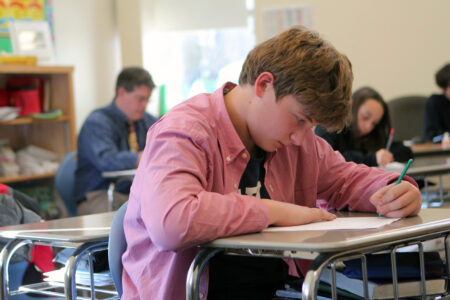 Students emerge as confident, competent learners who are comfortable working in a variety of settings and subject areas. The critical values we stress include self-reliance and cooperation, individual and group problem-solving, development of effective study habits, respect for individual differences, contribution to the community, and the pursuit of excellence.
Students emerge as confident, competent learners who are comfortable working in a variety of settings and subject areas. The critical values we stress include self-reliance and cooperation, individual and group problem-solving, development of effective study habits, respect for individual differences, contribution to the community, and the pursuit of excellence.
The core academic program in Grades 5 and 6 includes English (both reading and writing), mathematics, science, social studies, a choice of two world languages (French and Spanish), health and physical education, and visual and performing arts. Technology and its effective use are integrated throughout the curriculum, and all students benefit from a structured study-skills course.
Learning Beyond the Classroom
Students in the 5-8 Division also have the opportunity to participate in a variety of after-school programs including various clubs, sports, orchestra, and the school Musical (Grades 7&8).
Language Arts
English 5-8
A major element in the PCS language arts program is learning to write well. The main components of the writing program include narrative, persuasive, expository, and descriptive pieces with an emphasis on employing the writing process, on usage, sentence structure, mechanics, and (especially in the younger grades) spelling and penmanship.
Students write almost every day at low, medium, and high-stakes assignments, which are selected to encourage writing of all types and all ordering techniques—chronological, spatial, logical, and order of importance. The technique chosen must suit the task. For example, chronological order suits storytelling or explaining a process, while logical order suits a compare-contrast task. As their knowledge of all aspects of writing progresses, students are expected to apply these skills to their work in all subject areas. By the end of eighth grade, students’ writing should exhibit coherent thought, appropriate use of quotations, logical argumentation with connections between claims and examples, appropriate vocabulary, correct and varied sentence structure, and a sense of style and voice appropriate for the intended audience.
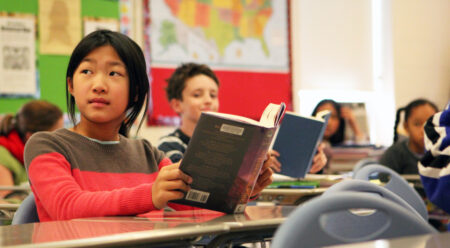 As students’ cognitive development allows them to think ever more abstractly and grasp the nuances of metaphor and other figurative language, the writing program continues to emphasize all kinds of writing in many different forms, such as stories, poetry, book reviews, letters, opinion pieces, and analytical pieces, especially on the literature they read. They also receive sequenced instruction in increasingly complex areas of usage—such as subject-verb and pronoun antecedent agreement, tense formation and consistency, and correct use of pronouns—and continue to receive grade-appropriate instruction in vocabulary acquisition skills and in spelling. They are expected to employ these skills in their writing as they learn them. By grade eight, students will have become proficient in writing a well organized, grammatically correct five-paragraph essay and will have begun to develop their own voice and style.
As students’ cognitive development allows them to think ever more abstractly and grasp the nuances of metaphor and other figurative language, the writing program continues to emphasize all kinds of writing in many different forms, such as stories, poetry, book reviews, letters, opinion pieces, and analytical pieces, especially on the literature they read. They also receive sequenced instruction in increasingly complex areas of usage—such as subject-verb and pronoun antecedent agreement, tense formation and consistency, and correct use of pronouns—and continue to receive grade-appropriate instruction in vocabulary acquisition skills and in spelling. They are expected to employ these skills in their writing as they learn them. By grade eight, students will have become proficient in writing a well organized, grammatically correct five-paragraph essay and will have begun to develop their own voice and style.
Reading
Language arts skills are the most essential part of a child’s early education. Students must learn to read so that they can read to learn.
As they advance in school, the students read, discuss, interpret, analyze, and compare literature of all forms, including plays, fiction, poetry, and nonfiction. By the end of eighth grade, students are careful readers, able to analyze the structure and style of a work of fiction, and to understand and summarize a written argument.
The PCS reading strategy recognizes that developing comprehension, building a vocabulary, and learning to infer meaning from context are critically important to advancing reading skills
For a full description of the language arts curriculum, click here.
Math
A strong foundation in mathematics is a prerequisite for success in our increasingly analytical world. Just as PCS is dedicated to early achievement in reading, early mastery of arithmetic skills and basic mathematical problem solving are viewed as essential first steps.
These goals are clearly set out in the school’s Charter
 PCS students master the basic mathematical skills identified by the 1977 National Council of Supervisors of Mathematics Position Paper on Basic Mathematical Skills, including problem solving; applying mathematics to everyday situations; alertness to the reasonableness of results; estimation and approximation; appropriate computational skills; geometry; measurement; reading, interpreting, and constructing tables, charts, and graphs; using mathematics to predict; and computer literacy. PCS adds to this list a knowledge of probability and statistics, risk, and orders of magnitude. Our students will need these to confront many of the complex social and technical issues facing society. The hour spent on mathematics each day includes a balance between discovery directed by the exchange of ideas between the teacher and the class, and direct presentation of material by the teacher. In addition, several hours each month are used for mathematical games, special topics, and experiments. The program is rich in the use of concrete materials and applications to develop concepts and to connect children’s intuition to abstract mathematics. Instruction cycles between using problems to motivate knowledge and using the knowledge base to solve problems. The problem-solving activities are carefully selected to challenge children to think creatively and to extend their knowledge. Applications for problem solving are to science, other aspects of the real world, and internal applications to mathematics itself.
PCS students master the basic mathematical skills identified by the 1977 National Council of Supervisors of Mathematics Position Paper on Basic Mathematical Skills, including problem solving; applying mathematics to everyday situations; alertness to the reasonableness of results; estimation and approximation; appropriate computational skills; geometry; measurement; reading, interpreting, and constructing tables, charts, and graphs; using mathematics to predict; and computer literacy. PCS adds to this list a knowledge of probability and statistics, risk, and orders of magnitude. Our students will need these to confront many of the complex social and technical issues facing society. The hour spent on mathematics each day includes a balance between discovery directed by the exchange of ideas between the teacher and the class, and direct presentation of material by the teacher. In addition, several hours each month are used for mathematical games, special topics, and experiments. The program is rich in the use of concrete materials and applications to develop concepts and to connect children’s intuition to abstract mathematics. Instruction cycles between using problems to motivate knowledge and using the knowledge base to solve problems. The problem-solving activities are carefully selected to challenge children to think creatively and to extend their knowledge. Applications for problem solving are to science, other aspects of the real world, and internal applications to mathematics itself.
What are the principal elements in PCS’s mathematics curriculum?
- Algebraic topics and geometry are woven throughout the curriculum, starting with simple intuitive concepts and progressing to more formal deductive reasoning.
- Computation is fundamental, but PCS also stresses problem-solving skills and strategies for word problems.
- All students have summer assignments in mathematics.
- In grades three through eight, students use advanced texts.
- Teachers use instructional time well; the daily hour is devoted strictly to mathematics.
- PCS students match their mathematics skills with other schools in a number of yearly contests including the New Jersey Mathematics League (grades 6 – 8) and MathCounts (grades 6 – 8).
For a complete description of the mathematics program, click here.
Science
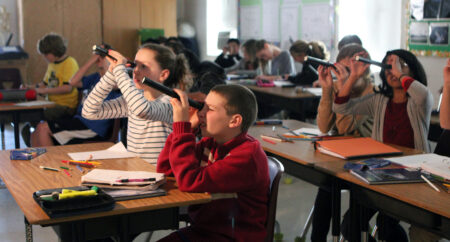 Princeton Charter School adopts a “minds-on, hands-on” approach to science education. We build on a base of regular science instruction in grades K through two and daily science instruction from grade three on. Students learn through a variety of instructional methods. These include formal and informal labs, lab simulation software, both inquiry and direct instruction, and a strong emphasis on quantitative methods. Instruction is supplemented with projects, contests, and kinesthetic activities. Curiosity and appreciation for the natural world, powerful reasoning skills, and an informed skepticism toward questionable claims are among the desired outcomes. The PCS science curriculum is a superset of the New Jersey Core Curriculum Content Standards for Science.
Princeton Charter School adopts a “minds-on, hands-on” approach to science education. We build on a base of regular science instruction in grades K through two and daily science instruction from grade three on. Students learn through a variety of instructional methods. These include formal and informal labs, lab simulation software, both inquiry and direct instruction, and a strong emphasis on quantitative methods. Instruction is supplemented with projects, contests, and kinesthetic activities. Curiosity and appreciation for the natural world, powerful reasoning skills, and an informed skepticism toward questionable claims are among the desired outcomes. The PCS science curriculum is a superset of the New Jersey Core Curriculum Content Standards for Science.
5-8 Science
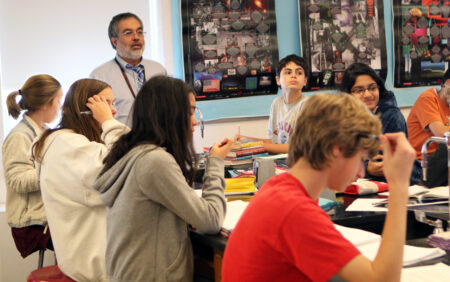 In grades 5-8 the approach becomes more rigorous and quantitative, as directed by the Charter. Students learn to ask quantitative questions and determine the information needed to answer them. As students improve their mathematical skills, they learn to apply them more extensively in the science program. Three major content areas are covered in middle school: physical science, life science, and earth science.
In grades 5-8 the approach becomes more rigorous and quantitative, as directed by the Charter. Students learn to ask quantitative questions and determine the information needed to answer them. As students improve their mathematical skills, they learn to apply them more extensively in the science program. Three major content areas are covered in middle school: physical science, life science, and earth science.
Some topics from each area are included each year. Emphasis is placed on understanding how facts are interrelated through natural laws and mathematical relationships. Some subtopics pervade multiple larger content areas, such as energy conservation, probability, and the effect of different scales on function and structure. Acquired process skills include: observing, measuring, classifying, recording, predicting, hypothesizing, inferring, experimenting, and conducting research. Of course, the political and social implications of scientific progress, both historically and currently, are discussed.
For a complete description of the science program, click here.
World Language
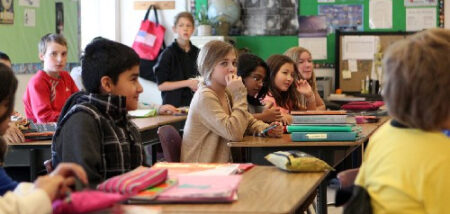 World Languages meet five days per week for 45 minutes. Since the classes are small, students are not tracked by level of proficiency.
World Languages meet five days per week for 45 minutes. Since the classes are small, students are not tracked by level of proficiency.
Through a communicative approach, students are immersed in the target language. They continue to expand and improve oral, reading, listening and writing skills simultaneously
French
When Princeton Charter School students enter the French program in Middle School they have already had at least 2 years of French (if they have come to the school in 3rd grade) or 6 years of French (if they have started in Kindergarten). Students are divided into two small sections of French. They meet five days per week for 45 minutes. Since the classes are small, students are not tracked by level of proficiency.
Through a communicative approach, students are immersed in the target language. They continue to expand and improve oral, reading, listening and writing skills simultaneously. Traditional methods of language learning , such as dictation, verbal conjugations, different pattern exercises and grammar review are incorporated in the instruction. Part of our academic philosophy is that a well educated student must understand the logic of language. Students who understand the logic of a second language tend to have a better understanding of their native language, have stronger critical thinking skills, and even perform better on standardized tests. Students do lots of creative writing in French, as well. They read and discuss some original pieces of French literature, poems, movies , video clips and pieces of art. Each year The National French Exam is offered to all students of French. Our rate of success is high. By the end of 8th grade, we expect our students not only to have a good level of oral proficiency in French, but also to have a basic grammatical culture, to know the main grammatical tenses, and to be able to express their thoughts both orally and in writing in the target language.
Spanish
Princeton Charter School Spanish Language Program goals are to teach children to communicate in a language other than their native language and to help children acquire an understanding of and an appreciation for other cultures.
Our curriculum is based on performance guidelines sponsored by the American Council of Foreign Languages (ACTFL) and the revised New Jersey Core Curriculum Standards.
Classes are conducted mostly in Spanish and employ a number of instructional techniques designed to help new and veteran learners acquire Spanish. We will be using the textbook, Paso a Paso, for theme based vocabulary and grammar, as well as readers and packets for authentic stories and legends. The stories and legends allow the students to use both grammar and vocabulary previously studied in a realistic environment. In class, students are introduced to new concepts and practice them through guided and monitored exercises. Students are expected to continue the learning process through homework and review outside of class.
For a complete description of the world language program, click here.
History
Princeton Charter School teaches history, geography, and social studies, from Kindergarten through the eighth grade. Children are introduced to history through stories and by fifth grade embark upon more serious study. The emphasis is on political, economic, geographic, cultural, and technological forces which have shaped the history of the world and of the United States. As demonstrated by the progress indicators in the Charter, the curriculum follows the guidelines of the New Jersey Core Curriculum Content Standards for Social Studies.
Starting in fifth grade, the students pursue a chronological study of world history and geography. The fifth grade studies civilizations up to approximately 500 B.C., including Mesopotamia, North Africa, China, India, and Mediterranean civilizations; the sixth grade does a chronological survey from 500 B.C. to 500 A.D., again on a world-wide basis, including classical Greece, Rome, China, and India; the seventh grade begins circa 500 A.D. and carries the narrative through the seventeenth century; and the eighth grade completes the narrative up to the modern age, including detailed focus on American history through the Civil War and Reconstruction period.
As they study the history of each region, the students analyze the interdependency between political and cultural developments and the physical environment. As part of the history curriculum, and at all grade levels, students are introduced to our system of government, along with others in the world.
PCS students learn geography in conjunction with their study of history. Map skills start with simple location and advance to interpretation of coordinates, elevations, economic and climatic data, etc. These mapping skills promote geometric concepts such as scale, coordinate systems, and two-dimensional projections of three-dimensional objects.
For a complete description of the history curriculum, click here.
PE
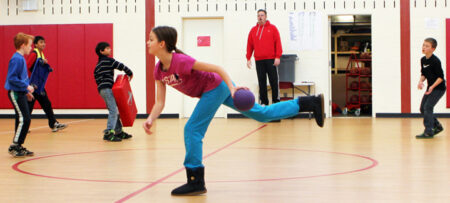 The Princeton Charter School believes the foundation for an active and healthy lifestyle is instilled at a young age. To support this idea, the Princeton Charter School promotes wellness and physical activity every day. Throughout the day each student has three fifteen-minute break periods. One of those break periods is a physical education break period. During the physical education break period, students are required to participate in a structured activity.
The Princeton Charter School believes the foundation for an active and healthy lifestyle is instilled at a young age. To support this idea, the Princeton Charter School promotes wellness and physical activity every day. Throughout the day each student has three fifteen-minute break periods. One of those break periods is a physical education break period. During the physical education break period, students are required to participate in a structured activity.
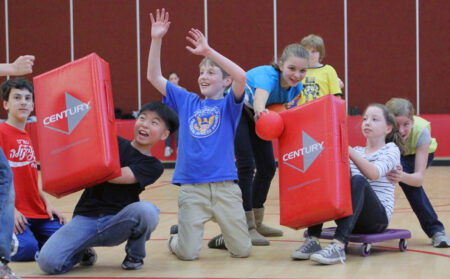 In addition to daily breaks, students attend regular physical education classes once every three days. The foundation of physical education class is formed through the use of the New Jersey Core Content Standards. Each activity is designed to support these standards and encourage a healthy and active lifestyle.
In addition to daily breaks, students attend regular physical education classes once every three days. The foundation of physical education class is formed through the use of the New Jersey Core Content Standards. Each activity is designed to support these standards and encourage a healthy and active lifestyle.
For a complete description of the Health & P.E. program, click here.
Art and Music
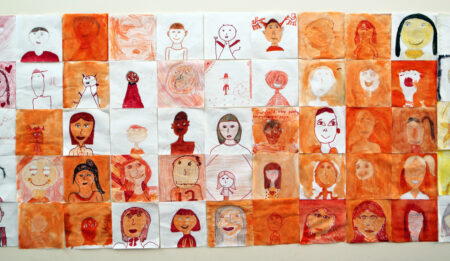 The arts are a fundamental component of the educational program at PCS. The curriculum includes visual arts, music, theater/drama, and folk dance. Following the New Jersey Core Curriculum Content Standards for the Visual and Performing Arts, our goal is to achieve art literacy for all students, i.e., to educate not only providers, but also recipients of the arts.
The arts are a fundamental component of the educational program at PCS. The curriculum includes visual arts, music, theater/drama, and folk dance. Following the New Jersey Core Curriculum Content Standards for the Visual and Performing Arts, our goal is to achieve art literacy for all students, i.e., to educate not only providers, but also recipients of the arts.
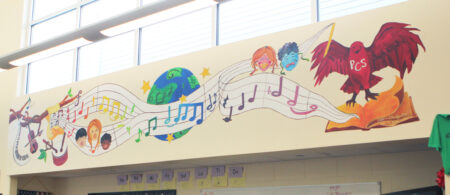 Arts education is best accomplished through participatory experiences. All PCS students actively “make art” from the earliest years.
Arts education is best accomplished through participatory experiences. All PCS students actively “make art” from the earliest years.
In music students are provided with choral singing experience, as well as age-appropriate classroom instrumental and recorder instruction. All students are exposed to notation and the basic rudiments of music theory. They learn about composers and study selected repertoire representing all periods of music. Combining sounds through their own improvisation and composition activities is an integral component of their music studies.
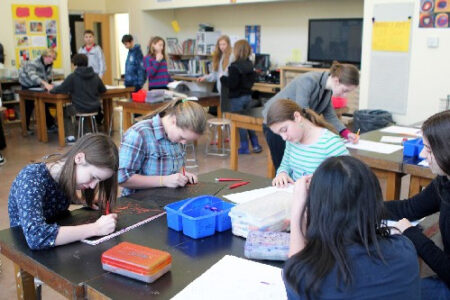 In visual arts, students learn the elements of drawing, painting, and sculpture. A variety of techniques for creating two or three-dimensional art are taught; creative explorations coexist with instruction in specific techniques.
In visual arts, students learn the elements of drawing, painting, and sculpture. A variety of techniques for creating two or three-dimensional art are taught; creative explorations coexist with instruction in specific techniques.
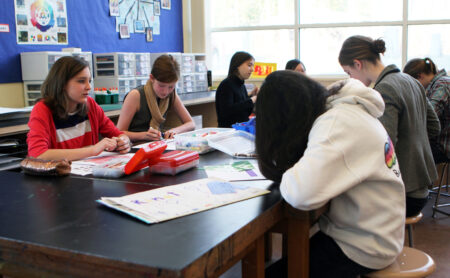 In addition to the art making” component, students learn the elements of each art form’s language. Differences and similarities among examples of the arts from around the world are analyzed. Uses of the arts, and conventions and fashions in the arts are discussed in conjunction with the study of art history. Students learn how to use the acquired knowledge, art vocabulary, and analytical skills to develop an aesthetic appreciation of the arts.
In addition to the art making” component, students learn the elements of each art form’s language. Differences and similarities among examples of the arts from around the world are analyzed. Uses of the arts, and conventions and fashions in the arts are discussed in conjunction with the study of art history. Students learn how to use the acquired knowledge, art vocabulary, and analytical skills to develop an aesthetic appreciation of the arts.
For a complete description of the art and music programs, click here.
